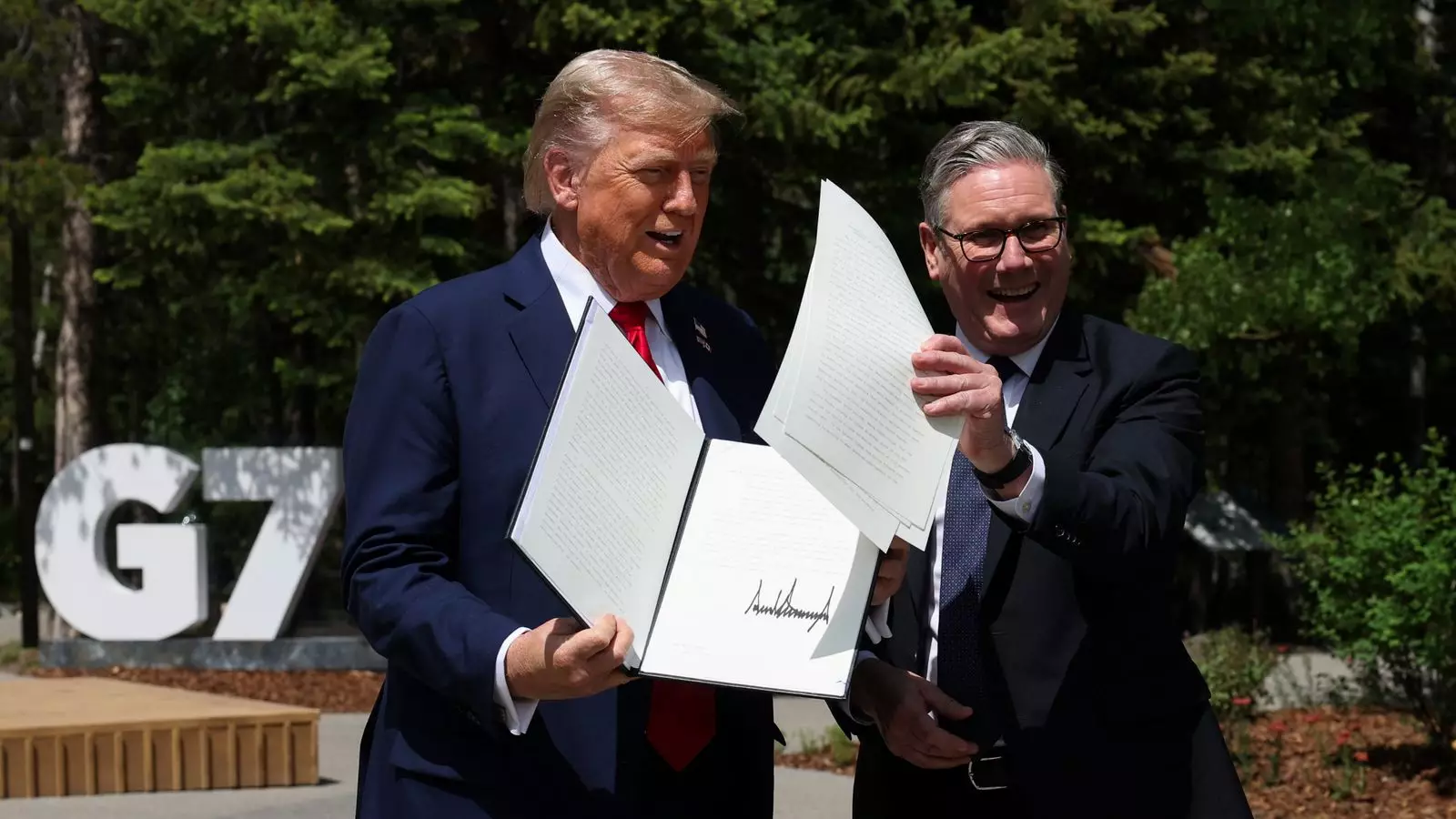In a world defined by economic volatility, the recent signing of the UK-US trade deal, heralded by US President Donald Trump and UK Prime Minister Sir Keir Starmer, seems at first glance to be a substantial achievement for both nations. Trump, in his flamboyant style, announced that the deal was “done” and would generate “a lot of jobs” and “a lot of income.” However, beneath the glittering surface of this announcement lies a stark reality: the deal is more of a fragile mirage than a robust agreement that genuinely serves the long-term interests of the people.
The situation reveals a concerning reliance on grandstanding and theatrics rather than on sustainable agreements that benefit both economies. Sir Keir Starmer’s commendation of the deal as a “really important agreement” suggests optimism that borders on naivety. While the reduction of tariffs on pivotal sectors such as automobiles and aerospace may be beneficial, the implications of these cuts are far from clear, particularly concerning future vulnerabilities and potential retaliatory measures led by the US.
Incomplete Information and Hidden Consequences
What is particularly striking about this trade agreement is the lack of transparency regarding specific terms. When Trump stated that the UK was “very well protected” against future tariffs, it raises eyebrows rather than assuaging concerns. It is troubling that he sidestepped crucial questions concerning levies on British steel exports to the US, opting instead to delay disclosures with vague promises of forthcoming information. This not only displays a lack of preparedness but raises questions about the underlying motives of US trade policy.
As they stood together at the G7 summit, a semblance of camaraderie appeared to flourish between Trump and Starmer. With Trump referring to Starmer as a “great” prime minister, one has to consider if this praise was genuine or merely an attempt by Trump to solidify his standing amidst a contentious domestic and international climate. The assumption that a liberal approach can coexist harmoniously with Trump’s notoriously aggressive economic policies seems overly optimistic, if not fundamentally misguided.
The Danger of Populism in Trade
One cannot overlook the undertones of populism that infuse discussions around trade nowadays. Trump’s rhetoric has often played to the fears of the working class, invoking nationalistic sentiments that impair rational dialogue on trade relations. By framing the deal with phrases like “Liberation Day” tariffs, he signals a willingness to exploit emotional sway rather than foster true collaboration. His administration’s trade strategy seems less about establishing equitable compromises and more about invoking a sense of nationalism that ultimately complicates international relations.
Starmer’s attempt to extend the olive branch to America during these discussions invokes the question of whether he risks sacrificing broader economic ideals for immediate political gains. As he described the agreement as vital for key sectors, one can’t help but wonder how many compromises were made to foster this supposed cooperation.
A Little Show, But What Lies Beneath?
During the press conference, the visual spectacle—the literal dropping of documents at a supposedly pivotal moment—served more than just comic relief; it illustrated an underlying message: there is a clumsy improvisational quality to this administration’s handling of such a critical agreement. Documents of major significance shouldn’t fall apart in the hands of their architects.
Moreover, a glaring error from Trump, as he mistakenly mentioned an agreement with the “European Union” in the presence of the UK Prime Minister, hints at the disarray and lack of focus governing US trade negotiations. Such blunders raise the question: how much weight can we attribute to this trade deal if its very conception is marred by misunderstandings and missed opportunities?
The UK-US trade deal might be celebrated as a diplomatic victory on the surface, yet when scrutinized through a liberal lens, it begins to unfold into a complex narrative of cooperation muddied by the trappings of populism and incomplete promises. As both leaders bask in the spotlight, one hopes that both countries recognize the myriad pitfalls awaiting them within this so-called fair agreement.

Leave a Reply